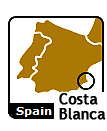Step by StepSample article from Spain magazine of July 2002The assumption that buying a property in Spain is similar to the UK can prove costly. A beginner's guide on what to do. BUYING a property in Spain is as safe as buying one in the UK, provided you take the right piuressional advice. You cannot, however, assume that because you know what you are doing when it comes to buying a home in the UK, you do not need legal advice when buying in Spain. Both the process of buying a home and the laws in Spain are different from those in the UK. Unfortunately, many first rime buyers in Spain are quite casual about the purchase and take little or no legal advice before signing legally binding documents. This is a costly mistake - they may find out too late that the property has no title, has debts attached to it, has been built without planning permission or that it does not even exist. There is no reason why this should happen to you provided that you take independent legal advice. DOING YOUR HOMEWORKThere is currently a property boom in Spain. Well-priced, attractive homes can sell very quickly. As a result you must do your homework before going to look for property to buy. Decide which area will suit you best. Think about how to get there. Are there cheap flights all year round? Is the place busy in the winter months or does it almost close down from October to March? Decide what type of property will suit you best. For many people who are in the market for a holiday home, an apartment or unit in a complex can be easier to manage and cheaper to run. Decide how much money you are willing to spend - and stick to it. When all these things are clear in your mind and you are ready to look at property, your first port of call should be your lawyer's office. Discussing the important matters of who should own the property and how you are going to finance your purchase is best done as early as possible, before you are in a rush or under pressure to sign a contract. If you've done the necessary preparatory work, you can move quickly when you find a property you like. When you do find a property, you will have to sign some form of contract and probably pay a deposit right away. Ideally, do not sign anything without getting it checked by your lawyer first.FINDING THE RIGHT PROPERTYThere are many sources of information about property in Spain. * UK-based estate agents or UK-based representatives of Spanish agents or developers. * Spanish-based agents or developers attending property shows and exhibitions in the UK * Spanish estate agents in the area where you are looking for property * Specialist magazines * The internet Whichever you use remember that they are making their money out of selling the property, not acting for you. Remember too that even the best estate agent can, inadvertently, have a "dud" property on his books. It is not part of the estate agent's job to check the title to properties he or she offers for sale.CHOOSING A LAWYERTHE NOTARY By law, all deeds of sale (escrituras de compraventa) must be signed in front of a Spanish public notary (notario). He carries out a basic check on ownership of the property, verifies the identity of the Buyer and Seller and witnesses the signature. He does not advise either the Buyer or the Seller but acts as an umpire. In particular, he is not there to advise on who should own the property, tax matters, inheritance rights, surveys, valuations, mortgages or the many other things you would expect from your UK lawyer when buying a house. Although most Spanish people would not use an independent lawyer unless the purchase was complicated, for a non-Spanish buyer the notary is no substitute for using your own lawyer.YOUR INDEPENDENT LAWYERThe lawyer can either be a Spanish abogado who is experienced in dealing with foreigners or is a specialist English solicitor. Do not underestimate the need for clear communication with your lawyer. If you use a Spanish lawyer, remember that most will know nothing about English law and so probably will not be able to advise you on any ramifications to your UK tax or legal position. Check how much your lawyer will charge and what is included in his fee. Be careful about using a lawyer recommended by or also acting for the Seller or Estate Agent.WHO SHOULD OWN THE PROPERTYThere are many options - you alone, you and your wife/husband/partner, your children, or a company (Spanish, English or offshore). The choice you make is extremely important as getting it wrong can cost you thousands of pounds in unnecessary taxes during your lifetime and on your death. Discuss this issue carefully with your lawyer.THE CONTRACTWhen you first see the home of your dreams you will probably have to move quickly if you don't want someone else to buy it. You will usually be asked to sign some form of contract and pay over a deposit. There are three basic types of contract that you might be asked to sign.THE OFFER TO BUYThis is a formal offer to buy the property at a certain price and it will remain valid for, say, two weeks. If the Seller accepts your offer within that time, it creates a binding contract between you. You will usually pay over a deposit, which will be released to the Seller if he accepts your offer. If you later decide not to proceed, you will probably lose your deposit.THE RESERVATION CONTRACTThis is an agreement between you and the Seller or Agerit. They agree to take the property off the market for a period of, say, three weeks. You pay a small "reservation fee" - say £3,000 (C-4,800). If you sign a full contract to buy the property within those three weeks the fee you paid will count as part of the price. If you decide not to go ahead then, unless there is a good legal reason, you may lose the fee paid. Check the contract carefully to see what happens in your case. There are certain basic clauses that should be included even in a simple reservation contract. Get it checked by your lawyer before you sign it. This can often be done simply by faxing the contract to the lawyer who will deal with it while you wait.THE PRIVATE PURCHASE CONTRACT (CONTRATO PRIVADO DE COMPRAVENTA)This is a full and binding contract to buy the house. It should contain all of the clauses you and the Seller rely upon, many of which will be unfamiliar to you. It would be very foolish not to get the contract checked by an independent lawyer before you sign it.AFTER THE CONTRACT - YOUR LAWYER'S CHECKLISTEach case requires slightly different checks. These are likely to include: · * Does the property have planning permission and a building licence? * Does it belong to the Seller? * Is it free of all debts, mortgages and tenants? * Does it have a habitation certificate? * If the property is part of a community, what are its rules and charges? * Does the Buyer have all of the paperwork necessary to buy the property? * Is the money being dealt with properly? Extra checks will be needed if you intend to use the property for business purposes or for a rental property.SPECIAL POINTS FOR NEW PROPERTYIf you are buying a property that has not yet been built, there are certain matters to consider. For example, you are by law usually entitled to a bank guarantee or insurance policy to guard against the risk of the builder going bust and being unable to finish the property. Some developers refuse to give these guarantees. There is also the question of stage payments and how and when they are to be made.THE PRICE TO BE DECLAREDThere is a long tradition in Spain of cheating the taxman by declaring less that the full value of the property in the escritura. This is illegal and dangerous and it can also prove expensive. Unless you can in turn find someone else to under~declare when you sell the property, you will have to pay capital gains tax on the paper profit you have made. There are times when you may be put under some pressure to under-declare the price. If so, you must discuss the situation with your lawyer before you proceed.SURVEYSIf you are buying an older property it can be a good idea to have a survey carried out on the property. Strangely, this is something much less common in Spain than in England. The cost will vary with the property but will start at about £450 (.C723) and your lawyer will be able to arrange this for you.PREPARATION FOR SIGNING THE ESCRITURA* Your lawyer should make a series of enquiries to make sure that everything is in order. * You will need a Spanish NIE (foreigners identification number). Either the estate agent or your lawyer can obtain this for you. * If you do not wish to be present in person when the escritura is signed, you will need to give someone the Power of Attorney to do so on your behalf. * You will need to make arrangements to transfer the funds to Spain. If you are signing a contract to buy a property and know you are going to need cures to pay for your house in, say, July 2002, you have three choices. You can either: 1 convert the necessary amount of pounds sterling to euros when the need arises; 2 convert your money now; 3 enter into a "forward contract" now to buy the cures in July 2002. If you do the first, you could be caught out by currency fluctuations. If the pound falls in value against the euro (and many experts predict it will), you can end up paying more than you anticipated for the house. If you convert your money now, you will know exactly how much your house will cost you but you will lose the use of your money for a long time. If you opt for the third choice, you will be given a guaranteed rate to buy the currency, very close to today's value. You pay 1 0 per cent now and the balance when you take the money. The choice you make is important and should be discussed with your lawyer at the start of the transaction.SIGNING THE TITLEThe escritura is signed in front of a notary, either by you or by the person who holds a Power of Attorney on your behalf. This is when the balance of the money is paid to the Seller and you take possession of the property. Once the escritura has been signed, your lawyer will arrange for the taxes to be paid and the title to be presented for official registration at the Land Registry. Registration typically takes about three months, but times vary from area to area. Once it is registered, the Land Registry will return the first copy of the escritura with proof of registration of title. You are then the fully protected owner of the property.THE COST OF BUYING PROPERTY IN SPAINThis includes taxes, land registry fees, notaries' fees, lawyer's fees, bank charges for transferring funds to Spain etc. It does not include surveys, mortgage fees or any extras. In the case of new properties the tax is sometimes included in the asking price. As a guideline, here is the cost of buying as a percentage of the price, according to property and area. A resale (secondhand) property in mainland Spain will run from nine to 1 1 per cent. A resale property in the Canary Islands will run at seven and nine per cent. A new property in mainland Spain will have a tax of seven per cent, then an additional three to four per cent for the cost of buying. A new property in the Canary Islands will have a tax of five per cent and additional costs of three to four per cent.WHAT ELSE DO I NEED TO DO?When you buy a home in Spain, you should make a Spanish will and a new English will. You will also need to take out property insurance and transfer all of the utilities into your name. You should appoint a "fiscal representative" to deal with your tax affairs in Spain. Your lawyer should advise you about these issues. This guide is both brief and general and is therefore no substitute for proper professional advice. Information by John Howell & Co, a specialist firm of English lawyers, with over 15 years experience of with the purchase of properly In Spain. John Howell & Co, Solicitors and international lavvyers, 17 Maiden Lane, Covent Garden, London WC2E 7NL, Te/: 020 7420 0400, fax. 020 7836 3626, ernail, info@europelaw.com. Website: www legal21.orgBack to Advice Page |







